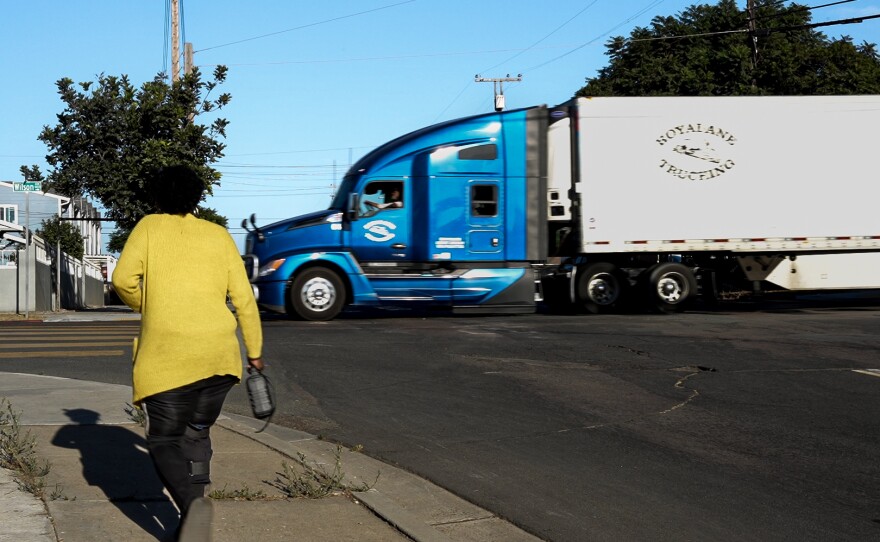National City residents and environmental advocates are trying to block a fuel transfer station from being built in an area already recognized by the state as one that has been impacted by industrial pollution.
They say the facility, run by Texas-based USD Clean Fuels, would further expose community members, already impacted by polluted air and high levels of asthma, to even more pollution. The project would be built along the railroad just off of 18th St., west of Interstate 5 in West National City, which the state has deemed a “Portside Environmental Justice Community.” The designation acknowledges the impacts of industrial emissions on residents.
“This is a historically overburdened community,” Kelsey Genesi told inewsource. Genesi is a policy advocate for the Environmental Health Coalition, a National City-based environmental justice group.
“I don't think there's anything wrong with this city looking and saying, yeah, it's an industrial zoned area where this would be. But what can we do to make it better? How can we make it more community friendly?” she said. “We just wonder how you can put an industry over your community's health?”
National City residents’ most recent attempt to intervene was at the October 15 City Council meeting where they voiced concerns for the health of the community.
This brief came from a note by Cynthia Quinonez, a San Diego Documenter, from a National City Council meeting this month. The Documenters program trains and pays community members to document what happens at public meetings. It’s run by inewsource, a nonpartisan nonprofit newsroom dedicated to investigative and accountability journalism. Read more about the program here.
The National City Energy Transition Project would receive biodiesel fuels by rail, mix them on site and ship them out by truck 24 hours-a-day. A company spokesperson said there won’t be any storage tanks on-site and the facility would use approximately 70 trucks per day, active mainly between the hours of 6 p.m. and 6 a.m. A company spokesperson said the trucks will “minimize impact by avoiding residential areas, schools, churches, and congested areas.”
The site is located within a half-mile of Kimball Elementary School with residential housing in-between.
Community advocates from the EHC cite a number of concerns including diesel emission pollution from the trucks transporting the fuels, fire risk near a residential community in the case of an accident as well as noise pollution during sleeping hours. They say that when they learned about the project, they set to work to inform the community so they could voice their concerns to City Council.
“They're the ones on the front lines of this issue,” Genesi said. “We know that they suffer tremendously from high rates of asthma. The cancer risk is incredible in communities that are similar to West National City, where they're overburdened by these polluting sources.”
Community efforts led to the City to carry out an environmental review of the project which is currently underway, Genesi said.
At the city council meeting earlier this month, community members weighed in on the topic, echoing concerns raised by the EHC.
Maria Sanchez, a resident of National City, said that she fears the project would impact community health, including her two grandchildren who both suffer from asthma. She says that she already struggles to keep her house clean from the black dust that permeates it on a daily basis.
“This is what we breathe everyday,” she said.
USD Clean Fuels says that the project includes safety precautions such as the use of non-sparking equipment and a strict no smoking or open flame policy. They also say that the project promotes sustainability by shipping fuel by train, removing 3.6 trucks per rail car.
But the project’s opponents say the company would not commit to using zero emissions vehicles at the facility, which would mean West National City residents would have to bear the impacts of diesel trucks carting fuels through their neighborhood.
In response to an inewsource inquiry about the concerns raised by EHC, the company sent a statement saying the public will have a chance to review and weigh in on a draft environmental impact report, detailing the findings, noise, traffic and other impact studies. They also said that the trucks taking the fuel away for distribution are owned by other companies.
Councilmember Luz Molina, who represents West National City, said that until the report comes out, she is staying open-minded about the project and listening to all parties involved.
“When I decided to run for office,” Molina said, “I was well aware of the fact that … environmental justice has been a critical issue for this community.”
Genesi, from the EHC, says Molina has been “very involved” in fielding concerns from the community.
U.S. Environmental Protection Agency research shows that people in low socioeconomic neighborhoods and communities are more commonly exposed to harmful air pollution as they are more likely to be in proximity to industrial areas.
Genesi said this project would continue that harm.
“It's hard to not realize what's happening in terms of the environmental racism that continues,” she said.







